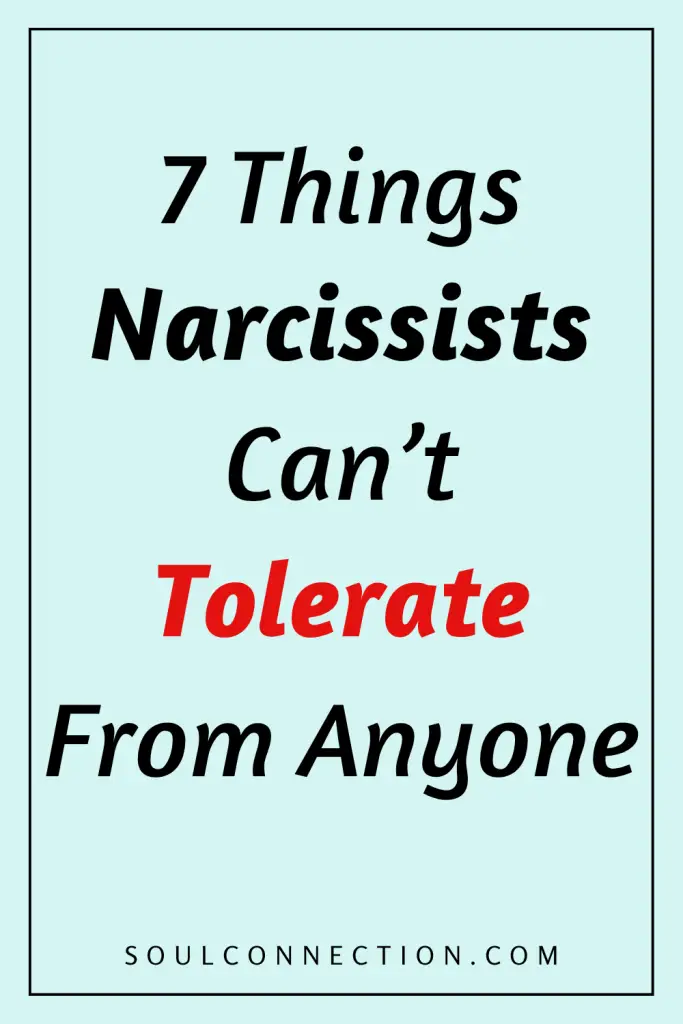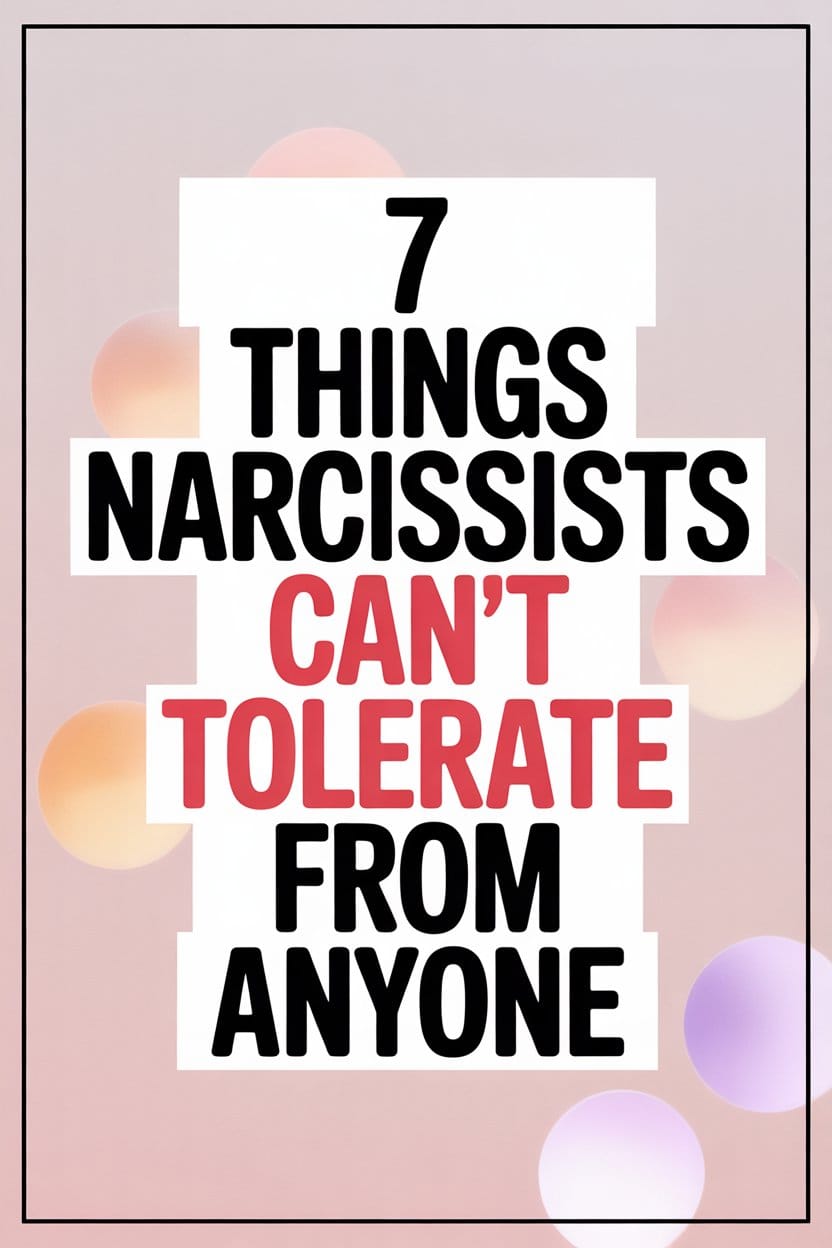People-watching is a national sport—especially when you’ve ever tangled with a narcissist. They might look ordinary enough, but the moment someone pokes at their carefully constructed ego, the fireworks begin.
Ever wonder what, exactly, flips their switch? Pull up a chair.
Here’s a tour through the seven things narcissists absolutely cannot handle—no matter how much they insist they’re “chill.”
1. Genuine Criticism
Feedback is the breakfast of champions—unless that champion is a narcissist. Give them honest, well-intentioned criticism and watch the pyrotechnics.
Even the gentlest suggestion lands like a slap. A comment as mild as “Maybe next time, keep the sauce on low?” can result in a frosty glare, dramatic sigh, or a soliloquy on why your taste buds are the real problem.
For a narcissist, criticism isn’t a chance to grow; it’s an existential threat. Someone dared suggest they’re not perfect? Time to deflect, deny, or dish out some criticism of their own.
If you must deliver feedback, tread lightly. Use the “compliment sandwich” (but expect they’ll only digest the bread).
More importantly, don’t expect a heartfelt “thanks for helping me improve!” That’s a unicorn you won’t see galloping by.
2. Indifference
Few things are more repellent to a narcissist than being ignored. Praise them, scold them, argue with them—at least you’re giving them oxygen.
But act indifferent? That’s kryptonite.
Suddenly you haven’t texted back quickly enough, or you let their great story roll off your back like water off a duck.
Cue the theatrics: attention-seeking, escalating behaviors, or that classic move where they feign utter disinterest in you (while checking if you noticed).
If you’re dealing with a narcissist, keep your cool.
Refusing to feed their need for attention might make you the villain in their soap opera, but it’s a surefire way to spot a hidden narcissist—most people don’t unravel if you skip a couple of emojis.
3. Boundaries
Healthy boundaries are a normal part of adult relationships. For a narcissist, they’re offensive.
Try telling them you won’t be answering work emails after 6 p.m., or that you’d like Sunday mornings for yourself. The reactions range from passive-aggressive guilt trips to outright tantrums.
Why? Boundaries remind them that you are, in fact, a separate person with your own needs and limits. That’s an affront to their world view, where everyone should orbit around them.
If you’re setting boundaries, stay firm but kind. Expect pushback.
Don’t let guilt steer you off course—after all, you’re not asking for the moon, just a little space to breathe.
4. Being Outshone
Spotlight hogging is a narcissist’s favorite dance move. They crave being the most interesting, successful, or attractive person in the room.
If someone else gets more applause—whether it’s a work promotion, a killer joke at a party, or simply a killer new haircut—the narcissist’s envy alarm starts blaring.
You might see them attempt to one-up you, belittle your achievement, or suddenly “remember” they once did something similar, but better.
If all else fails, they might sulk or withdraw, making you wonder if you accidentally committed a crime by being competent.
If you’re celebrating a win, don’t let their cold shoulder freeze your joy. Share your happiness with those who can cheer for you sincerely.
You deserve fans, not just critics.
5. Authentic Vulnerability
Getting real—emotionally, not reality-TV style—makes relationships richer. Vulnerability builds trust. It also makes narcissists deeply uncomfortable.
Honest conversations about fears, past mistakes, or heartaches don’t compute for them. They’re either threatened by your openness (which highlights their own emotional stuntedness), or they’ll weaponize your honesty later.
Worse, your vulnerability might open the door for empathy—something they treat like it’s got cooties.
If you want a relationship with genuine connection, you’ll notice quickly whether the other person can reciprocate. Narcissists tend to avoid these moments or turn them into opportunities to shift the spotlight back to themselves.
Don’t be surprised if your heartfelt story is followed by “Wow, that’s wild. Reminds me of when I…”
6. Accountability
Everyone messes up. Mature adults own their mistakes, apologize, and try to do better. For narcissists, admitting fault is as appealing as biting into a lemon slathered in hot sauce.
Blame-shifting is their Olympic sport. Did they hurt your feelings? Somehow, you made them do it. Called out for being late?
It’s the traffic, their boss, the alignment of the planets—any excuse but personal responsibility.
If you’re having these circular arguments where you feel like you’re the prosecutor and the jury, it’s not your fault. Try keeping receipts (figurative or literal).
When you calmly state facts, you cut down on the gaslighting. But don’t expect a warm apology. That’s as rare as an honest politician at election time.
7. Genuine Equality
Healthy relationships thrive on give and take. Narcissists prefer give (from you) and take (by them).
The idea of true equality—where both voices and needs matter equally—is about as appealing as a flat warm beer at a summer barbecue.
If you assert your right to contribute, make joint decisions, or ask for your preferences to be considered, watch for subtle sabotage.
They might agree in theory, but find “reasons” your ideas won’t work or simply bulldoze ahead with their own plans.
Don’t get sucked into the illusion that you’re just being “difficult.” Equality should never feel like a favor being granted.
If you notice consistent pushback when you stand your ground, you’re not imagining things.
When Enough Is Enough
Recognizing these patterns doesn’t make you a cynic; it makes you savvy. Narcissists are champions at muddying the waters, but these triggers reveal what’s really going on under the surface.
If you’re exhausted from tiptoeing around someone’s ego, consider what it would feel like to let your guard down, laugh at yourself, and celebrate your wins with someone who genuinely cheers for you.
Healthy relationships require some effort, sure. But they never require you to shrink, walk on eggshells, or trade your self-respect for someone else’s comfort.
Remember, you deserve people who can take a joke, take a hint, and—on rare occasions—take responsibility.
And if you spot someone bristling at these seven things, at least you’ll know: it’s not you. It’s them.


